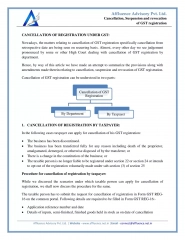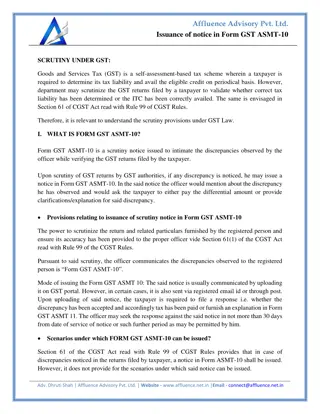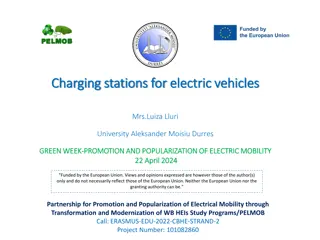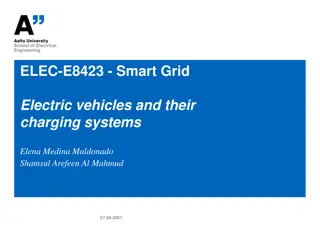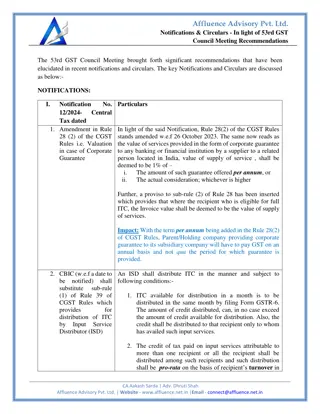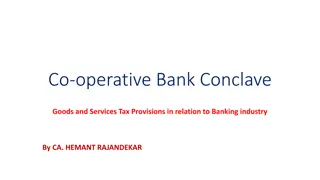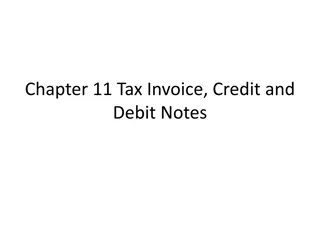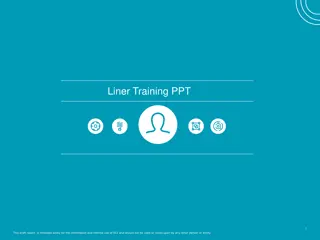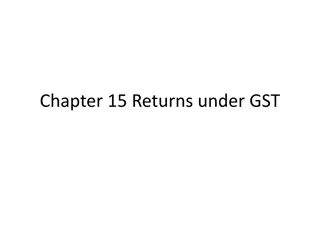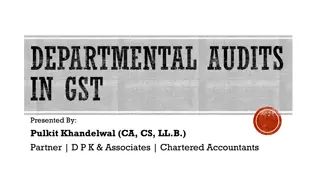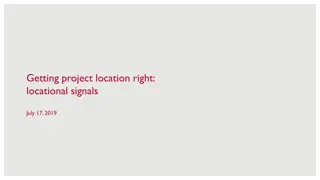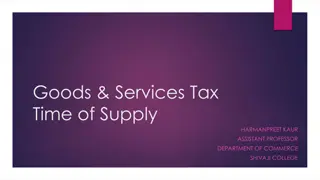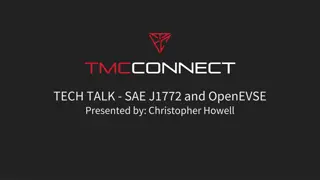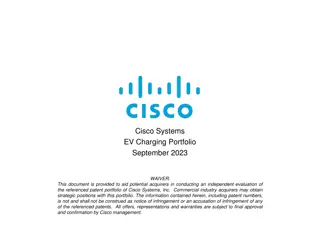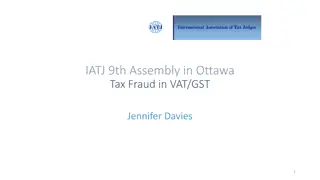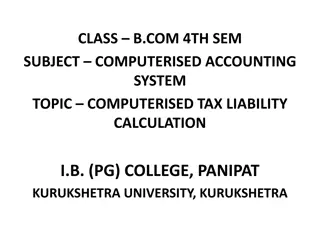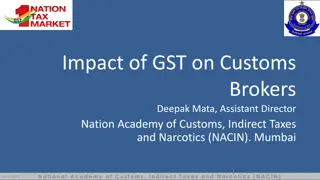Understanding Cross Charging and multi-locational units under GST
Cross charging and multi-locational units are important concepts under GST for businesses operating in multiple states. This includes registration requirements, supply definitions, and consequences for stock transfers. Learn how these aspects impact taxation and compliance in the GST framework.
Download Presentation

Please find below an Image/Link to download the presentation.
The content on the website is provided AS IS for your information and personal use only. It may not be sold, licensed, or shared on other websites without obtaining consent from the author. Download presentation by click this link. If you encounter any issues during the download, it is possible that the publisher has removed the file from their server.
E N D
Presentation Transcript
Cross charge under GST Cross charge under GST (By G. Natarajan) (By G. Natarajan)
Multi Multi- -locational units. locational units. Factory in one or more States. Depots and Warehouses in many States. - Either commercial necessity. - Or to avoid CST liabilities.
Registration requirements. Registration requirements. Separate registrations for all manufacturing units / Depots and warehouses passing on Cenvat benefit. Central Excise Separate registrations in all States. VAT/CST Centralised Registration facility. Service Tax Separate registration in each State is a must. Within a State also separate registrations can be opted. GST
Sec. 7 (1) (a) Supply includes all forms of supply of goods or services or both such as sale, transfer, barter, exchange, licence, rental, lease or disposal made or agreed to be made for a consideration by a person in the course or furtherance of business.
Is Stock transfers a supply? Is Stock transfers a supply? No as consideration is absent? No as consideration is absent? NOT SUPPLY Warehouse State - B Factory State - A S U P P L Y ITC CHAIN IS BROKEN WHAT TO DO?
Schedule I. 2. Supply of goods or services or both between related persons or between distinct persons as specified in section 25, when made in the course or furtherance of business. Sec. 7 (1) (c) Supply includes the activities specified in Schedule I, made or agreed to be made without consideration SECTION 25 (4) A person who has obtained or is required to obtain more than one registration, whether in one State or Union territory or more than one State or Union territory shall, in respect of each such registration, be treated as distinct persons for the purposes of this Act.
Consequences Consequences When goods are moving from one distinctperson distinctperson , even without any consideration flowing, GST is payable (Stock transfers). to another When one distinctperson provides any service to another distinct person , GST is payable.
Business practices Business practices Cost sharing among all units of an entity is an accounting requirement to assess the profitability of different units (Apportionment of cost / Cross charge). All common expenses are apportioned to all units on some reasonable basis. But the Profit and Loss A/c and Balance Sheet will be prepared for the entity as a whole.
Registered office / head office manages all units, whether HO is providing service to all the units? Eg. HO Staff cost. Common services procured by RO / HO for the entity as a whole are used by all units of the entity. Eg. Rent of RO / HO; Auditing; Financing; etc. Cross charge and GST All such common cost has to be cross charged to all units of the entity on some rational basis and appropriate GST paid? How to be value? Invoice has to be raised?
How Input Service Distributor and cross charge can go in tandem?
Columbia Asia Hospitals case Columbia Asia Hospitals case AAR [2018 (15) GSTL 722 [2018 (15) GSTL 722 AAR] AAR AAR] The question before AAR was : Whether the activities performed by the employees at the corporate office in the course of or in relation to employment such as accounting, other administrative and IT system maintenance for the units located in the other States as well i.e. distinct persons as per Section 25(4) of the Central Goods and Services Tax Act, 2017 (CGST Act) shall be treated as supply as per Entry 2 of Schedule I of the CGST Act or it shall not be treated as supply of services as per Entry 1 of Schedule III of the CGST Act? .
Columbia Asia Hospitals case Columbia Asia Hospitals case AAR [2018 (15) GSTL 722 [2018 (15) GSTL 722 AAR] AAR AAR] The applicant was already paying IGST on common services procured from outside and charged to other units. The ruling was sought only as to employee cost. They were not charging GST on employee cost, attributable to other units, as employment is outside GST. It was argued that employee of HO, is employee of the entity and hence employee of all the units and just because the different units are distinctpersons under GST, they do not cease to be common employees of all units of the entity.
Columbia Asia Hospitals case Columbia Asia Hospitals case AAR [2018 (15) GSTL 722 [2018 (15) GSTL 722 AAR] AAR AAR] Finding of AAR : Regarding the second issue related to the activities performed by the employees at the corporate office in the course of or in relation to employment, the employees employed in the Corporate Office are providing services to the Corporate Office and hence there is an employee-employer relationship only in the IMO. The other offices are distinct persons and therefore the employees in the IMO have no employer employee relationship with other offices. The services provided to the employer, i.e. the corporate office by the persons employed by the corporate office are in the nature of the employee- employer relationship. Further, since the corporate office and the units are distinct persons under the Act, there is no such relationship between the employees of one distinct entity with another distinct entity, at least as per the Goods and Services Tax Act, even if they are belonging to the same legal entity.
Columbia Asia Hospitals case Columbia Asia Hospitals case AAAR [2019 (20) GSTL 763 [2019 (20) GSTL 763 AAAR] Upheld the ruling of AAR. The services of the employees at the IMO in so far as they are benefiting the other registered units of the appellant, will not be termed as employee-employer relationship and will therefore not fall within the purview of Entry 1 of Schedule III Also made certain observations on ISD Vs Cross Charge. AAAR AAAR]
How to value ? How to value ? Second proviso to Rule 28. Provided further that where the recipient is eligible for full input tax credit, the value declared in the invoice shall be deemed to be the open market value of the goods or services. (Specsmakers AAAR). Where full ITC is not eligible - Open market value (Apportionment on a reasonable basis). - Issue invoice. Recipient can take ITC. No need for payment within 180 days.
GST Council discussions & Draft Circular GST Council discussions & Draft Circular
GST Council discussions & Draft Circular GST Council discussions & Draft Circular .3.1. Question Is it mandatory to distribute input tax credit (hereinafter referred to as ITC ) in respect of input services (IS-1), procured by HO but attributable to both HO and BOs, following the Input Service Distributor (ISD) procedure? Answer -Yes, it is mandatory to follow ISD procedure laid down in Section 20 of CGST Act read with rule 39 of the Central Goods and Services Tax Rules, 2017 (hereinafter referred to as the CGST Rules ) for distribution of ITC in respect of input services procured by HO from a third party but attributable to both HO and BO or exclusively to one or more BOs.
GST Council discussions & Draft Circular GST Council discussions & Draft Circular 3.2. Question Will the input service (IS-1) procured by HO from a third party for use by the BOs, the ITC of which is distributed in accordance with the ISD procedure, be treated as a supply by HO to the BOs and will it be taxable in the hands of HO. Answer No, the services procured by HO from a third party for use at HO and BOs, or exclusively for use by BOs, the ITC of which is distributed in accordance with the ISD procedure laid down in Section 20 of the CGST Act read with rule 39 of the CGST Rules, would not be separately treated as supply by the HO to the BOs.
GST Council discussions & Draft Circular GST Council discussions & Draft Circular 3.3. Question If HO considers that procurement, distribution and management of common input services for use by HO and BOs as per ISD provisions leads to an expense, how can it apportion these expenses to the BOs? Answer HO may incur certain expenses on procurement, distribution and management of common input services. The HO may or may not apportion and recover such expenses from BOs. Nevertheless, such procurement, distribution and management of services by the HO for the BOs is a separate service provided by the HO to the BOs. It should be invoiced by the HO to the BOs to the extent of expense incurred by the HO. It is a service distinct from those services the ITC in respect of which has been distributed through the ISD procedure. It is for the HO to value the service as per the principles laid down in para 3.6 below.
GST Council discussions & Draft Circular GST Council discussions & Draft Circular 3.4. Question If the HO generates some services internally such as common administration by maintaining common administration team for BOs and HO (C1 in the matrix above), or common IT maintenance through a maintenance team at HO (C2 in the matrix above), where the team members are the employee of the HO, are these employees providing any service to the BOs? Answer 3.4.1. The offices or establishments of an organisation in different States are establishments of distinct persons under sub-section (4) of section 25 of the CGST Act and Explanation 1 of section 8 of the Integrated Goods and Services Tax Act, 2017 (hereinafter referred to as the IGST Act ). GST law envisages these distinct registered persons to be independent entities, though part of one legal entity, and they can be providing services to each other. 3.4.2. Whether employees posted in HO, who look after administration of HO and BOs or maintenance of machines installed in the HO and BOs or perform similar other functions for the organization as a whole or for a particular BO which is a distinct person, are providing service to BOs is not the correct perspective to be determined here. The correct perspective for examining the issue at hand would be to determine whether the HO and BOs are providing services to each other and not whether the employee of HO is providing services to the BOs. In this case, it is the HO which is providing services to BOs.
GST Council discussions & Draft Circular GST Council discussions & Draft Circular 3.5. Question What is the legal basis for concluding that HO is providing services to the BOs in the above example? Answer HO and BOs are distinct persons in terms of sub-section (4) of section 25 of the CGST Act. They are also related persons as defined in Explanation (a) to section 15 of the CGST Act. It may be noted that the supply of goods or services or both between related persons or between distinct persons, when made in the course or furtherance of business is a supply even if it is made without consideration in terms of para 2 of Schedule I to the CGST Act. Thus, services produced or generated in HO by its employees and used by or supplied to BOs, with or without consideration, are supplies liable to GST. The HO should invoice such supplies to the BOs, whether HO charges any consideration for such supplies from BOs or not is immaterial. The same principle would apply for supply of services by a BO to another BO (B1in the above matrix) or by a BO to the HO.
GST Council discussions & Draft Circular GST Council discussions & Draft Circular 3.6. Question How would these services provided by one entity to another of a body corporate, registered as distinct entities (C1 and C2 in the above matrix) be valued? Answer- 3.6.1. As regards valuation of such supplies, since HO and BOs located in different States are related persons, value of such supplies cannot be determined under sub- section (1) of section 15 of CGST Act. The same has to be determined under sub- section (4) of Section 15 of CGST Act read with the rules made thereunder. According to rule 28 of the CGST Rules, the value of supply of goods or services between distinct persons or related persons shall, a) be the open market value of such supply; b) if the open market value is not available, be the value of supply of goods or service of like kind and quality; c) if the value is not determinable under clause (a) or (b), be the value as determined by the application of rule 30 or rule 31 of the CGST Rules, in that order. 3.6.2. The rule further provides that where the recipient is eligible for full ITC, the value declared in the invoice shall be deemed to be the open market value of the goods or services.
GST Council discussions & Draft Circular GST Council discussions & Draft Circular 3.6.3. Illustration -HO has sent an annual expense budget of Rs 10 lakh for the administrative division looking after the personnel administration of the employees in HO as well as two BOs located in two different States. The value of services supplied by the HO to BO-I may be determined under rule 31 of the CGST Rules using any reasonable means consistent with the principles of valuation contained in the CGST ACT. For example, value V of service provided by HO to BO-1 for managing administration of staff can be determined as follows: Value V = (Y/N) x Rs.10,00,000/- Where, Y is the number of employees in BO-1; And N is the total number of employees posted in the HO and two BOs.
GST Council discussions & Draft Circular GST Council discussions & Draft Circular 3.7. Question If there is an input service, clearly attributable to a BO, can it be contracted by the HO and paid for by the HO. How would this credit be transferred to the BO? Answer HO can distribute ITC in respect of input services procured on behalf of BO following the ISD procedure laid down in section 20 of CGST Act read with rule 39 of the CGST Rules. There is no restriction on HO acting as common procurement centre for all the services required by a business. If a service is specifically attributable to a BO, it shall be distributed to that BO only in terms of clause (c) of sub-section (2) of section 20 of the CGST Act.
GST Council discussions & Draft Circular GST Council discussions & Draft Circular 3.8. Question There are some services internally generated which are clearly identifiable as those pertaining to another distinct person, how would these be taxed? For example, if two persons in BO1 do work related to IT development for a project contracted by BO-2 (service B1 in the above matrix), how would it be taxed? Answer- 3.8.1. In this case, BO-1 is providing service to BO-2 by way of assistance in the IT development work undertaken by BO-2. BO-1 should invoice this service to BO-2 and pay GST on it. Value of the service may be determined by using any reasonable means as illustrated below:
GST Council discussions & Draft Circular GST Council discussions & Draft Circular 3.8.2. Illustration - Assuming that each of the two engineers of BO-1, who assisted in the software development project undertaken by BO-2 as shown in the above matrix, draws salary and emoluments on cost to the company (CTC) basis of Rs. 1.00 lakh per month and puts in, on an average, 200 hours of work per month, and devoted 50 hours each for the project undertaken by BO-2, the value of service (B1) supplied by BO-1 to BO-2, by way of assistance in a project belonging to BO-2, may be determined using reasonable means under rule 31 of the CGST Rules as under: Value of service B1= Employee cost + Establishment cost of supplying 100 man-hours. Employee cost of 100 man-hours supplied by BO-1 to BO-2 may be calculated in this example as under: = (100000/200)*50*2 To this may be added the establishment cost of supplying 100 man-hours following any reasonable method consistent with the generally accepted accounting principles as illustrated in para 3.6.3 above.
GST Council discussions & Draft Circular GST Council discussions & Draft Circular 4. Accordingly, it is reiterated that where a taxpayer, registrant in different States, is a distinct person, then (i) An employee of a HO (registered as a separate entity) does not provide any services to a BO, rather it is the HO which provides service to the BO. (ii) There is a need to apportion expenses incurred by one office for provision of output services to another office by any reasonable means consistent with the principles of valuation in the GST law and the generally accepted accounting principles. (iii) Such apportionment/valuation of supply shall be done on the basis of information maintained by a company in its normal course of working. There is no need to maintain additional records of activities undertaken by individual employees. (iv) The only exception to this principle would be distribution of ITC in respect of input services procured by one office and distributed to the others for which ISD provisions apply as the taxpayer is expected to mandatorily obtain ISD registration if he has to distribute ITC on input services.
Way forward Way forward Common services procured by HO (with GST), be distributed to all units through ISD. Common services procured by HO (without GST) by be cross charged to all units with GST. Other common expenses incurred in HO (employee cost, common goods consumed, etc.) to be cross charged with GST. If recipient eligible for full credit, even a nominal value can be adopted for all such common expenses. If recipient not eligible for full credit, valuation based on Rule 28.
Cutting the food to fit the shoe? Cutting the food to fit the shoe? Why not remove services from S.No. 2 of Schedule I ? Why not an exemption be given for supply of services between distinct persons?
THANK YOU THANK YOU G. Natarajan, Advocate, Swamy Associates G. Natarajan, Advocate, Swamy Associates 93400 54477 93400 54477 nuts@ nuts@swamyassociates.com swamyassociates.com


